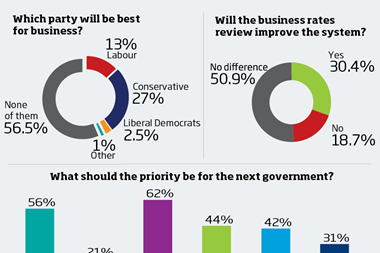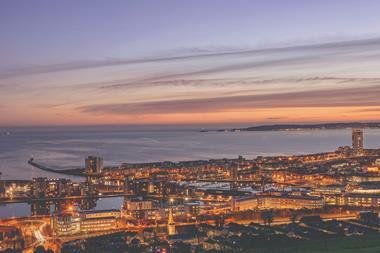There were a number of pleasing pledges made by all the political parties when they launched their general election manifestos last week.

Each party put a strong emphasis on building a robust and resilient economy. There was widespread recognition of the need to review the business rates system. We saw an increased focus on devolution across the board.
All of these promises are good news for our industry and we hope to see them implemented thoughtfully and thoroughly once the new government is in place.
However, welcome as these pledges were, they felt like only pieces of a bigger jigsaw puzzle. Surely a manifesto is the opportunity to showcase the whole picture - to inspire us all with a vision for the future.
One thing lacking in all of the manifestos was a long-term vision and strategy for our towns and cities.
This general election is taking place against a backdrop of increasing globalisation, urbanisation and digitisation, but there was little to show how the parties believe these macro trends will play out across the UK, what their impact will be and how in government they will partner with the relevant industries to make sure the UK is able to keep up with the pace of change.
We have seen how these three trends have had a significant impact on the real estate industry over the past few years.
They have caused the fabric of our buildings to change. Developers now include bike racks and showers in their buildings as par for the course, as the workforce becomes more health- and environment-conscious. Tech companies have brought in trends from Silicon Valley, so their work spaces now include break-out areas and coffee stations. Offices are designed to accommodate hot-desking, as workers enjoy increased flexibility and sometimes work from home.
The people who own these buildings have also changed. In 2013, we saw overseas investors become the largest single category of commercial property owners in the UK for the first time.
Our industry has proved adaptable so far, but there are more challenges ahead.
Urbanisation has led to approximately 50% of the world’s population living in a city and it is estimated that London is set to see a 37% increase in population from 2011 to 2050, with a resident population of 11.3 million.
Where are all these people going to live and work? How will they travel to their jobs and homes? Will we have enough power, electricity and water to support them? We will need huge amounts of infrastructure to provide for these people, and not just road and rail.
The real estate industry will play an important part in allowing government to meet these challenges, but we are yet to see either the narrative from politicians that demonstrates they have a strategy to meet and embrace these challenges, or the agenda that will support critical industries such as real estate in its delivery.
The policies that have been announced so far need to be joined up in a coherent vision that sets out a long-term plan for the UK as it will look in the future and for the industries that will shape the environment in which we live and work.
Melanie Leech is chief executive of the British Property Federation





























No comments yet